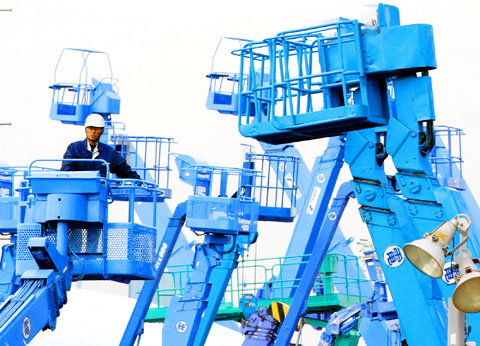Asia needs to craft out a new growth plan because the export-led model that has served the region well is no longer feasible, the UN Development Programme (UNDP) said yesterday.
“Going back to the growth model of the last two decades is tempting as it brought Asia the dynamic momentum for rapid growth and signs of prosperity,” the UNDP said in a report on the impact of the global crisis on the region.
“But this is neither feasible nor desirable, and so the crisis is also an opportunity for many countries in Asia to re-orient their growth and development strategy,” it said.

PHOTO: REUTERS
The export-led model pursued by many Asian economies, while it has created stellar growth rates, has also resulted in rising urban-rural inequality, the UNDP said.
“Asia’s record growth performance has come at a price,” it said.
The UNDP said Asia must recognize that the imbalances created by the export-led model will only worsen further if policymakers fail to address the issues effectively.
“On current trends, Asia’s growth imbalances — with growth driven by investment in industry and services in urban areas, environmental strains, and income inequality — are likely to become worse.”
In the report, the UNDP called on Asia’s policymakers to look to building up domestic demand and boosting intra-regional trade rather than continue to rely on the Western economies which have been squeezed badly by the global crisis.
“Given the sharp actual decline and projected stagnation in export demand, it is critical that domestic demand rises rapidly in these countries,” the UNDP said.
To a certain degree, this is already taking place within the region, it said.
“There have already been significant moves towards this, especially through extension and deepening of bilateral and regional free trade agreements … The potential for expansion in such areas is now greater than ever before.”
The UNDP said Asia is already showing signs of recovery but cautioned there were risks of asset bubbles in some economies and unwinding the vast fiscal spending measures would be a key challenge for governments next year.
“To a certain extent, the recovery in some countries in the region has been associated with quick and proactive counter-cyclical monetary and fiscal policies that were designed to avoid the kind of sharp collapses in output and employment that were experienced during the Asian financial crisis,” it said.
“However, unwinding these policies will be tricky and will remain a major issue in early 2010 as asset bubbles may have formed in some markets which have exceeded fundamentals,” the UNDP said.

Nvidia Corp yesterday unveiled its new high-speed interconnect technology, NVLink Fusion, with Taiwanese application-specific IC (ASIC) designers Alchip Technologies Ltd (世芯) and MediaTek Inc (聯發科) among the first to adopt the technology to help build semi-custom artificial intelligence (AI) infrastructure for hyperscalers. Nvidia has opened its technology to outside users, as hyperscalers and cloud service providers are building their own cost-effective AI chips, or accelerators, used in AI servers by leveraging ASIC firms’ designing capabilities to reduce their dependence on Nvidia. Previously, NVLink technology was only available for Nvidia’s own AI platform. “NVLink Fusion opens Nvidia’s AI platform and rich ecosystem for

‘WORLD’S LOSS’: Taiwan’s exclusion robs the world of the benefits it could get from one of the foremost practitioners of disease prevention and public health, Minister Chiu said Taiwan should be allowed to join the World Health Assembly (WHA) as an irreplaceable contributor to global health and disease prevention efforts, Minister of Foreign Affairs Lin Chia-lung (林佳龍) said yesterday. He made the comment at a news conference in Taipei, hours before a Taiwanese delegation was to depart for Geneva, Switzerland, seeking to meet with foreign representatives for a bilateral meeting on the sidelines of the WHA, the WHO’s annual decisionmaking meeting, which would be held from Monday next week to May 27. As of yesterday, Taiwan had yet to receive an invitation. Taiwan has much to offer to the international community’s

CAUSE AND EFFECT: China’s policies prompted the US to increase its presence in the Indo-Pacific, and Beijing should consider if this outcome is in its best interests, Lai said China has been escalating its military and political pressure on Taiwan for many years, but should reflect on this strategy and think about what is really in its best interest, President William Lai (賴清德) said. Lai made the remark in a YouTube interview with Mindi World News that was broadcast on Saturday, ahead of the first anniversary of his presidential inauguration tomorrow. The US has clearly stated that China is its biggest challenge and threat, with US President Donald Trump and US Secretary of Defense Pete Hegseth repeatedly saying that the US should increase its forces in the Indo-Pacific region

ALL TOGETHER: Only by including Taiwan can the WHA fully exemplify its commitment to ‘One World for Health,’ the representative offices of eight nations in Taiwan said The representative offices in Taiwan of eight nations yesterday issued a joint statement reiterating their support for Taiwan’s meaningful engagement with the WHO and for Taipei’s participation as an observer at the World Health Assembly (WHA). The joint statement came as Taiwan has not received an invitation to this year’s WHA, which started yesterday and runs until Tuesday next week. This year’s meeting of the decisionmaking body of the WHO in Geneva, Switzerland, would be the ninth consecutive year Taiwan has been excluded. The eight offices, which reaffirmed their support for Taiwan, are the British Office Taipei, the Australian Office Taipei, the